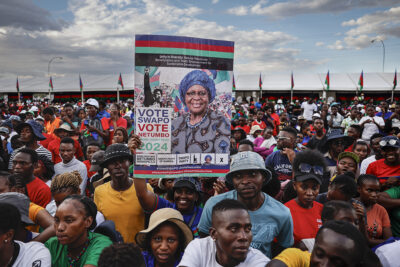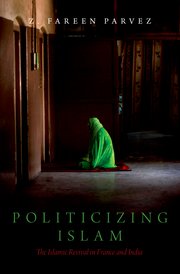Politicizing Islam is a comparative ethnography that analyzes the religious and political dynamics of the Islamic revival in France and India, home to the largest Muslim minorities in Western Europe and Asia. These two secular democracies make for a productive comparison on the topic of Islam and politics, despite their obvious differences. In both places, Muslims have long been racialized and suffer disproportionate rates of poverty and unemployment. Islamic revival and the reactions to it in the last two decades have struck at the core of both nations’ secular doctrines. The arguments presented in the book draw on two years of participant observation research in Lyon and the Indian city of Hyderabad, two cities with significant numbers of Muslims and forms of Islamic revival that the state has targeted in various ways. Specifically, I show how the politics of Islamic movements differ across class, a crucial factor that existing literature has largely overlooked.
Latest posts
Jeffrey Stout to give Gifford Lectures
by Olivia WhitenerReligion Unbound: Ideals and Powers from Cicero to King May 1 – May 11, 2017, 5:30 p.m. to 6:30 p.m. Business School Auditorium, University of Edinburgh In “Religion Unbound,” a 2017 Gifford Lecture Series hosted by the College of Arts, Humanities, and Social Sciences at the University of Edinburgh, Professor Jeffrey Stout (Princeton University) will trace the ideal’s history and explain how its defenders have defined and criticized religion.
Civility, identity, and agency
by Jeffrey CollinsAs an American teaching university in Canada, where the illiberal regulation of disfavored speech is increasingly common, I am tempted to simply applaud Bejan’s book. (Or perhaps place a bulk order for distribution at a future faculty meeting.) The politics of personal outrage has reached an exhaustion point. University campuses are bedeviled by a paradoxically aggressive discourse of vulnerability, victimhood, and “triggers". Vaguely Orwellian “human rights tribunals” police speech with increasingly minute attention. Bejan astutely suggests that the war on “hatred” (and for civility) is often disingenuously waged to silence dissent or enforce moral consensus. Trump may well represent a Molotov cocktail thrown by those resentful of these constraints. (Though his own appalling weaponization of insult and ridicule indicates the limitations of a politics of pure verbal transparency.)
Civility, toleration, and “human rights as empathy”
by Catherine ArnoldAs part of her argument in favor of mere civility, Bejan decisively rejects contemporary “civilitarian” claims that mutual respect and affection for one’s opponents are the minimum necessary for civil discourse. Her critique rests on her reading of John Locke. Although political scientists usually describe Lockean toleration as ethically minimal, Bejan contends that Locke actually imposed significant ethical demands on members of a tolerant society. Locke’s demanding theory of civil charity may not provide the most practical solution to our current crisis of civility. However, Bejan’s reading of Lockean toleration as civil charity does have important implications for the histories of human rights and humanitarianism. Historians have recently begun to examine historical moments in which humanitarian concern for the victims of bodily depredation fused with rights talk, creating a type of liberal human rights politics that Stefan-Ludwig Hoffmann calls “human rights as empathy.” The early eighteenth century was one such moment. Between 1690 and 1750, Britain began to engage in humanitarian diplomacy to prevent Protestants, Catholics, and Jews in other European states from being punished for their religious beliefs. In what follows, I will suggest that Bejan’s reading of Locke helps to explain why and how this politics—which fused natural law arguments with appeals to humanitarian sentiment—developed in early eighteenth-century Britain.
Power and civility
by Murad IdrisMere Civility’s final rendering of the link between civility and the future is suggestive; it excavates a democratic ethos from mere civility. Bejan points to an egalitarian openness about the future of others, asking citizens to engage with opponents while understanding that the person they are now may not be the person they will become. But if citizens are thus future strangers to each other, they are also strangers to their future selves. We might then add what Williams refused to say or recognize about himself—and which, importantly, did not happen: that he, too, could have come to agree with or belong to the groups he targeted with his “evangelical toleration” and held in disdain. It should be troubling that Williams’s rendering of civility anticipates the conversion of all others, but not his own; that his politics revolve around a theology in which those marked as different need to be rescued and saved; and that his approach to difference predicates the value and inclusion of others upon their transformability.
Seinfeld, Roger Williams, and religious toleration
by Samuel StablerGeorge: This is what she said to me, “Can we change the subject?” Jerry: See, now that I don't care for. George: Right. I mean, we're on a subject. Why does it have to be changed? Jerry: It should resolve of its own volition. George: That’s exactly what I said, except I used the word “momentum.” Jerry: Momentum - same thing. (Seinfeld S7E02, “The Postponement”) This comedic blip from Seinfeld might seem miles away from the early modern debates around religious toleration, but Teresa Bejan’s Mere Civility demonstrates that early modern thinkers expressed similar concerns about the power of free-flowing conversation. In this reading, Martin Luther, George, and Jerry stand on one side, defending the importance of ongoing debate. On the other side stand early-modern strategies of tolerance that use speech norms to keep peace in the face of religious argument. For both sides of this debate, republican notions of civility can provide important ways of situating a demand to either continue or avoid further discussion.













